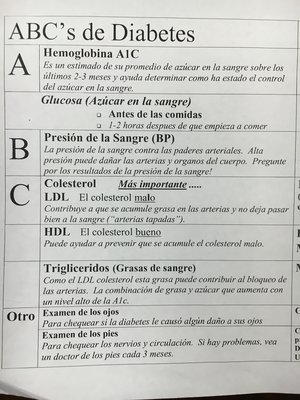La Cultura Como Medicina: Culture as Medicine

For patients with diabetes, it can be a challenge learning how to manage the condition. There are typically many lifestyle changes that people need to make in order to keep their blood sugar levels stable and to prevent serious complications from the disease. However, it can be even more of a challenge when there isn't much information about diabetes management that is relevant to the patient's culture. Culturally competent care is defined by the Georgetown University Health Policy Institute as,'the ability of providers and organizations to effectively deliver health care services that meet the social, cultural, and linguistic needs of patients." In fact, meeting the needs of diverse patients helps improve health outcomes. The General Medicine Clinic at the Cook County Fantus Health Center has begun to address the social, cultural, and linguistic needs of Hispanic patients by offering a diabetes management class for Spanish speaking patients.
For the past several months, I have been educating patients in this diabetes class for Spanish-speaking patients. I hold cooking demonstrations of healthy recipes that are not only easy to make, but culturally appropriate for this population. Recently, I have also been teaching patients how to utilize technology, such as smartphone apps and websites, that are written in Spanish and can help them manage their diabetes. I also help patients create health goals as their'homework" for the next class. These goals are small lifestyle changes they can make in order to better control their diabetes. At the next class, they discuss whether or not they were successful at accomplishing their goals. Patients have a chance to give each other advice about what things have worked for them in their diabetes management journey and motivate each other to make healthy lifestyle changes. They also talk about what cultural challenges they face in managing their diabetes, such as eating foods from their culture that aren't very healthy, and how to overcome these obstacles.
Every culture is unique, but even people with different backgrounds can still find commonalities in their language, culture, and traditions in this class. I specifically recall a class around the holidays where the patients were discussing their cultural holiday traditions and what kinds of foods they typically eat around that time of year. Even across borders, patients from Mexican to Uruguayan heritage still had traditions in common and could find ways of bridging cultural gaps to find healthy ways of preparing food for the holidays. At the end of the class, they shared a table and socialized over a healthy lunch. This created a sense of community, even across cultural barriers, because they share not just a language but similar foods, traditions, pop culture references, and jokes. In this class, culture is used as a medicine for healing and promoting better health.

This post was written by NHC Chicago member Katie Reed.
Katie serves as a Health Navigator at Smart Chicago Collaborative.